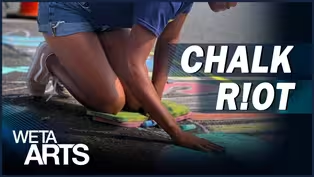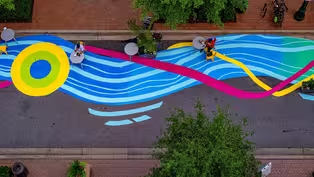
Maria Manuela Goyanas Has Big Ideas For Woolly Mammoth
Clip: Season 11 Episode 1 | 7m 57sVideo has Closed Captions
Felicia Curry chats with Maria Goyanas, Woolly Mammoth Theater's new Artistic Director.
In this exclusive interview, Felicia Curry sits down with Maria Goyanas, the second Artistic Director of Woolly Mammoth Theater. Maria discusses her journey to this groundbreaking playhouse and her vision for the company. She also highlights Woolly Mammoth's rich history of aesthetic innovation and civic provocation, showcasing the legacy left by co-founder Howard Shawwitz.
Problems playing video? | Closed Captioning Feedback
Problems playing video? | Closed Captioning Feedback
WETA Arts is a local public television program presented by WETA

Maria Manuela Goyanas Has Big Ideas For Woolly Mammoth
Clip: Season 11 Episode 1 | 7m 57sVideo has Closed Captions
In this exclusive interview, Felicia Curry sits down with Maria Goyanas, the second Artistic Director of Woolly Mammoth Theater. Maria discusses her journey to this groundbreaking playhouse and her vision for the company. She also highlights Woolly Mammoth's rich history of aesthetic innovation and civic provocation, showcasing the legacy left by co-founder Howard Shawwitz.
Problems playing video? | Closed Captioning Feedback
How to Watch WETA Arts
WETA Arts is available to stream on pbs.org and the free PBS App, available on iPhone, Apple TV, Android TV, Android smartphones, Amazon Fire TV, Amazon Fire Tablet, Roku, Samsung Smart TV, and Vizio.
Providing Support for PBS.org
Learn Moreabout PBS online sponsorshipWhen Woolly Mammoth Theatre's co-founder Howard Shalwitz decided to retire as artistic director, he had been the only person in that role for the company's 40 years.
In that time, Woolly found a home in Penn Square, a loyal following, and national acclaim.
I met with Maria Manuela Goyanes, who succeeded Shalwitz in 2018, to talk about where she's steering this groundbreaking playhouse.
Tell us a little bit about why you chose to come be the second artistic director here at Woolly Mammoth Theatre.
When I got the call about Woolly Mammoth Theatre, I was at the Public Theater in New York.
That's my hometown.
I had a great gig, but I kept thinking about a theater company in the middle of the nation's capital that has a risk profile, like Woolly Mammoth, doing work that is challenging, getting to launch careers for writers.
And I thought to myself, "This is actually a call that I need to take."
What about the history of Woolly was exciting to you?
Howard Shalwitz built something that has two pillars that I really stand behind.
One is esthetic innovation and the other is civic provocation.
Some of the plays that have premiered here have gone on to great success nationally.
"Mr. Burns" by Anne Washburn.
All: ♪ And no one shouted, "Flee" ♪ We've done all of the plays by Danai Gurira, who is brilliant.
Really sort of amazing, exciting writers.
I feel like I've been trying to have a conversation with the audience that Howard started.
That's "Fairview."
That's "Ain't No Mo'."
So, basically, trying to have a space where particularly the Black folks in the community actually see experimentation.
Us leaving this land ain't what's easy, ain't what's smooth, it's what builds.
It's radical that you are here.
You are a first-generation Latinx woman who is running a theater in the middle of Washington, DC.
Tell us all how you got here.
My dad is from Spain and fixed the buses in New York City.
My mom is from the Dominican Republic.
She was a kindergarten teacher.
I had my nose in books all the time and had a big imagination.
And it was a teacher that changed my life who brought us to the Manhattan Theater Club to see "Blue Window" by Craig Lucas.
Allison Janney was in it, and Joe Mantello directed it.
And I'm like, here, 15, 16 years old, looking at it and being like, "I could totally do this better."
I felt my imagination completely turned on and I was like, "Oh, my God, this is like books on stage.
I want to be here.
I want to be doing this."
I went to Brown University and I started doing theater there and I was like, "Mom and Dad, I'm going to get a job.
I promise you I'm going to do it."
And I worked at every theater company I could get my hands on.
I did everything that I could to be seen as somebody who should be working there.
At the Public, I was helping people make their work happen.
Here I get to pick it.
I get to actually open the door and say, "Hey, do you want a production?
Do you want to work on this with us?"
And that feels like, yeah, a dream come true.
For risk-taking shows, What is the success?
And you could talk about also the success of the awards and the accolades.
Don't skip out on those, but-- I was gonna say, winning a Tony Award is not a bad-- Talk about it.
Is not a bad night, let me tell you.
It was actually pretty great.
And what's so amazing about winning a Tony Award for "A Strange Loop" is just how much cultural opinion has changed.
The idea that a Black, queer, gay person of size at the center of a musical could actually attract over 300,000 people in to go see that show, it's, like, mind-blowing.
Man: ♪ I woke up this morning, I told myself to try ♪ ♪ I told myself that I would make no compromises ♪ For me, success is very specific for each show.
Success is Ryan Haddad getting to play his show more than 4 times in a row.
He's an actor with cerebral palsy, and we gave him that opportunity to actually deepen his craft.
I'm not upset about having a disability.
I'm upset about the way people treat me.
Tell us a little bit about the partnerships that you have here at Woolly Mammoth Theatre.
Our first show of the season is a co-production with the Wilma Theater Company in Philadelphia, a play by a Ukrainian playwright named Sasha Denisova called "My Mama and the Full-Scale Invasion."
The show is about Sasha's 82-year-old mother who is living in Kyiv in the Ukraine and has been since the start of the war, and it's all about Sasha imagining her mother on the front lines.
We have a show that has been touring the country-- "Where We Belong" by Madeline Sayet-- about Madeline going to get her PhD in Shakespeare in the UK and having some cognitive dissonance with them about their culture and their lack of understanding of colonialism.
We're also going to be doing this great new play by Vivian J.O.
Barnes, who's from Northern Virginia, called "The Sensational Sea Mink-ettes."
It's like Rockettes, but Mink-ettes, and it's about a dance squad in an HBCU, and it's all about perfectionism and Black womanhood.
We've got a play by Adil Mansoor.
He is a Pakistani- American artist who has never come out to his mom.
I really was moved by Adil's story about trying to get closer to his mom and trying to actually be able to be more himself.
And we also have a partnership with John Jarboe, the artistic director of the Bearded Ladies Cabaret in Philadelphia.
John wrote this amazing cabaret music show called "Rose: You Are What You Eat."
John is trans and queer, goes by she/her pronouns, and her aunt let her know that actually John was a twin on the ultrasound.
And then the twin disappeared.
The whole show is all about gender cannibalism [laughs], and John maybe eating her twin sister and now having an identity that also includes her.
Everything you're talking about in this season is exactly what you said-- risk taking.
Asking the people in the audience to envision the humanity of others in a different way.
What do you envision for Woolly moving forward?
When Howard Shalwitz was leaving, the question was whether or not Woolly Mammoth could withstand a founder transition.
And, for me, we need theaters like Woolly Mammoth to push our artists, push our audiences, push our society to be more creative, more participatory, more engaged, more equitable, more inclusive, more radical.
And so, for me, it's about shoring up Woolly Mammoth so that, you know, in 5 or 10 years, the next person can come in and never have it be a question whether or not Woolly Mammoth should continue to exist.
We are so lucky to have you here.
Maria, thank you for this time.
Thank you and good luck with everything at Woolly Mammoth this season.
Curry: Woolly Mammoth Theatre is at 641 D Street Northwest near Gallery Place Metro.
Go to woollymammoth.net for more information on their programs and for tickets.
Chalk Riot's Sidewalk Art Helps Revive Communities
Video has Closed Captions
Clip: S11 Ep1 | 8m 23s | Chalk Riot, a dynamic public art company, is transforming downtown Silver Spring. (8m 23s)
DC's Spoken Word to Go-Go Competition Crowns a Champion
Video has Closed Captions
Clip: S11 Ep1 | 9m 45s | Three poets compete in the finals of the "Spoken Word to Go Go" competition. (9m 45s)
Preview: WETA Arts September 2023
Preview: S11 Ep1 | 30s | Spoken Word to Go-Go; ChalkR!ot’s street art; Woolly Mammoth Theatre’s artistic evolution (30s)
Providing Support for PBS.org
Learn Moreabout PBS online sponsorship

- Arts and Music
The Best of the Joy of Painting with Bob Ross
A pop icon, Bob Ross offers soothing words of wisdom as he paints captivating landscapes.












Support for PBS provided by:
WETA Arts is a local public television program presented by WETA



